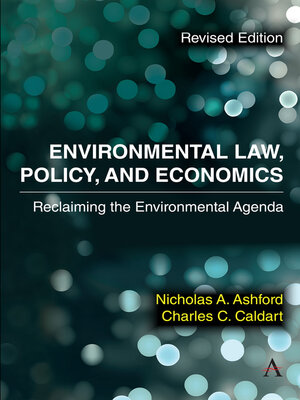Environmental Law, Policy, and Economics
ebook ∣ Reclaiming the Environmental Agenda · Strategies for Sustainable Development Series
By Nicholas A. Ashford

Sign up to save your library
With an OverDrive account, you can save your favorite libraries for at-a-glance information about availability. Find out more about OverDrive accounts.
Find this title in Libby, the library reading app by OverDrive.



Search for a digital library with this title
Title found at these libraries:
| Library Name | Distance |
|---|---|
| Loading... |
This textbook is designed to introduce the reader to important and emerging issues in contemporary environmental law, policy, economics, and science. It explains the roles and interactions of Congress, federal agencies, state governments, and the courts in protecting the environment and public health from pollution. Topics include common law; administrative law; the role of environmental impact assessments and endangered species protection; and the principal legislation and court decisions dealing with greenhouse gas emissions, conventional and toxic air pollution, water pollution, the control of toxic chemicals and hazardous waste, pollution prevention and primary accident prevention, and community right-to-know. The text also explores various alternatives to regulation and concludes with a brief treatise on sustainability.
The evolving role of science and economics in legislative, regulatory, and judicial decision making is explored. The text analyzes pollution as an economic problem and a failure of markets, discusses the role of technological innovation and the concept of "dynamic" economic equilibrium, and evaluates economic incentives as an alternative or supplement to regulation. The book also provides an introduction to basic legal skills: how to read and understand judicial opinions, regulations, and statutes; how to discover the current state of the law in a specific area; and how to take action toward resolution of environmental problems. Throughout, the role of national and local politics in shaping and implementing environmental policy is acknowledged and evaluated.







